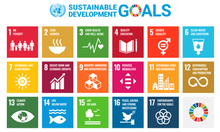User:Drianpaul/sandbox
Human Rights Economy[edit]
"what we need is a human rights economy - an economy that upholds the dignity and rights of all and promotes sustainable development that leaves no one behind."[1]
| United Nations of Human Rights Economy |
|---|
A Human Right Economy is an economic framework that aims at enhancing promotion or human rights for all, without discrimination. Gathering multiple campaign themes of the Office of the United Nations High Commissioner for Human Rights for the purpose of advancing Human Rights as an Authoritative Normative throughout the world. A Human Rights Economy requires transparency, accountability, protection of civic space for social dialogue, and accepts security as meaningful participation in order to adapt to societal needs of many different governance types around the world.
Background[edit]
History[edit]
Objectives[edit]
| Sustainable DevelopmentCreating Sustainable Living Goals | Authoritative NormativeCreating Normative Policies | Social WelfareChanging The way Welfare Works | ||||
 |
||||||
|
|
|
| ||||
| Global HealthHealthcare as a Human Right | DiscriminationInclusion for Those left out | Public InvestingBudget Priorities | ||||
|
|
|
| ||||
Sustainable Development[edit]
People-centered economic policies with commitment to health-conscious environmental procedures.
Authoritative Normative[edit]
Aligned political directives that align with Human Rights Principles outlined in the "UDHR". Using International Law as a mechanism that holds private and public sector actors accountable for violations of Human Rights. Incorporating all sectors of Economics actors including international financial bodies and institutions to be held at the same standards presented by the Universal Declaration of Human Rights. Centering Macroeconomic policies to maximize available resources, including through progressive taxation and curtailing illicit financial flows. For meeting the essential levels of all Economic, social and cultural rights, thereby enabling states to secure their minimum core Human Rights Obligations.[2]
International & Domestic Data[edit]
Collection and Disaggregation of Data with the inclusive objectives - giving rights to all counted individuals within groups. All measures and counts in relation to economics, global health, or nature of social standing - all that have a relation to Economic, social and cultural rights, will be included in important policy related decisions that affect mass majority of public quality of life.
Social Welfare[edit]
A Human rights Economy shifts away from a Social welfare model into a new designed idea meant to support economic diversity and growth through human rights accountability and inclusion. Shifting away from Structural power relations of the dominant socio-economic architecture and placing human beings as a subject within the center of the framework. PRiorities will be inclusive to groups submitted to structural disadvantages through special temporary measures and affirmative actions. To reverse wrongful policy actions which produced historical disadvantages.
Global Health[edit]
A human Rights Economy prioritizes social spending on Universal Health Coverage for all, as a fundamental human right. The right to health is an underlying determinant of other human rights access.
Discrimination[edit]
Inclusion and dismantling Discrimination factors such as Gender, Age, Disadvantaged Person(disabled), sexual minorities, Stateless and undocumented persons. Discrimination on basis of Race, Ethnicity, Religion and other beliefs, and cultural values. Aims to reverse the top-down approach currently implemented within policies and programs for social, justice, and quality of life reforms.
Public Investing[edit]
A Human Rights economy prioritizes budget decisions aimed at increse effective public investments in relation to Economic, social and cultural rights (e.g health, food, water and sanitation, housing, education, and social protection, etc), and to reduce inequalities within and between countries. Including social protection systems that adapt to changing climate of unrest. Addressing Economic Shock, Social and political upheavals, as well as manmade and natural distasters. Including examples of COVID-19 to support resilience, wellbeing, and stability during Pandemic events.
Expand fiscal space to ensure States meet their core obligations on minimum essential levels of ESCR by
- Ring-fencing and/or increasing social spending during economic downturns.
- Implementing counter-cyclical fiscal policies to avoid retrogression of ESCR;
- Ensuring that other pressing obligations - such as servicing of debt - do not take precedence over human rights obligations that require social spending;
- Reallocating public expenditure (re-directing resources);
- Expanding the tax-base and introducing progressive fiscal policies;
- Tackling illicit financial flows and corruption;
- Ensuring that limited resources are used efficiently, effectively and equitably;
- Reviewing IFI financing and conditionalities to assess how these can support or do not undermine human rights obligations of States on health, social protection, housing, food, water and education; and
- Increasing budget transparency, meaningful participation and accountability.
